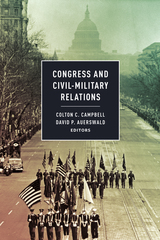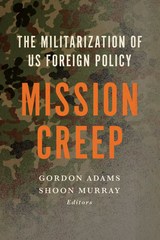
While the president is the commander in chief, the US Congress plays a critical and underappreciated role in civil-military relations—the relationship between the armed forces and the civilian leadership that commands it. This unique book edited by Colton C. Campbell and David P. Auerswald will help readers better understand the role of Congress in military affairs and national and international security policy. Contributors include the most experienced scholars in the field as well as practitioners and innovative new voices, all delving into the ways Congress attempts to direct the military.
This book explores four tools in particular that play a key role in congressional action: the selection of military officers, delegation of authority to the military, oversight of the military branches, and the establishment of incentives—both positive and negative—to encourage appropriate military behavior. The contributors explore the obstacles and pressures faced by legislators including the necessity of balancing national concerns and local interests, partisan and intraparty differences, budgetary constraints, the military's traditional resistance to change, and an ongoing lack of foreign policy consensus at the national level. Yet, despite the considerable barriers, Congress influences policy on everything from closing bases to drone warfare to acquisitions.
A groundbreaking study, Congress and Civil-Military Relations points the way forward in analyzing an overlooked yet fundamental government relationship.

Mission Creep: The Militarization of US Foreign Policy? examines the question of whether the US Department of Defense (DOD) has assumed too large a role in influencing and implementing US foreign policy. After the Cold War, and accelerating after September 11, the United States has drawn upon the enormous resources of DOD in adjusting to the new global environment and challenges arising from terrorism, Islamic radicalism, insurgencies, ethnic conflicts, and failed states.
Contributors investigate and provide different perspectives on the extent to which military leaders and DOD have increased their influence and involvement in areas such as foreign aid, development, diplomacy, policy debates, and covert operations. These developments are set in historical and institutional context, as contributors explore the various causes for this institutional imbalance. The book concludes that there has been a militarization of US foreign policy while it explores the institutional and political causes and their implications.
“Militarization” as it is used in this book does not mean that generals directly challenge civilian control over policy; rather it entails a subtle phenomenon wherein the military increasingly becomes the primary actor and face of US policy abroad. Mission Creep’s assessment and policy recommendations about how to rebalance the role of civilian agencies in foreign policy decision making and implementation will interest scholars and students of US foreign policy, defense policy, and security studies, as well as policy practitioners interested in the limits and extents of militarization.
READERS
Browse our collection.
PUBLISHERS
See BiblioVault's publisher services.
STUDENT SERVICES
Files for college accessibility offices.
UChicago Accessibility Resources
home | accessibility | search | about | contact us
BiblioVault ® 2001 - 2024
The University of Chicago Press









